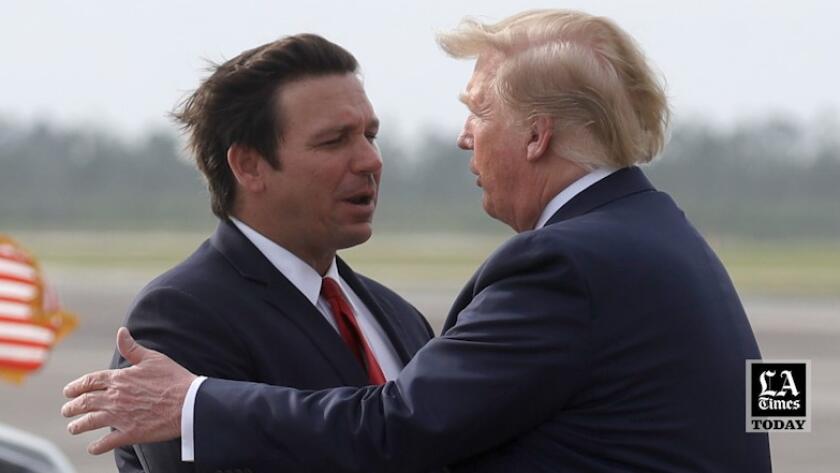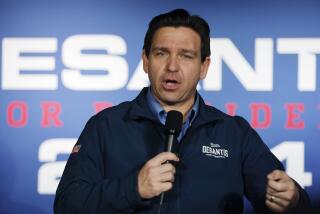Column: DeSantis wants to displace Trump as the GOP’s 2024 nominee. But he has hurdles to overcome

- Share via
WASHINGTON — Florida Gov. Ron DeSantis hasn’t announced that he’s running for president, but he’s doing a convincing job of acting like a candidate.
DeSantis, who rarely speaks without reminding listeners that he won reelection by a margin of almost 20%, is on a coast-to-coast tour to court Republican voters and contributors.
He spoke to conservative donors in Florida on Thursday and Texas Republicans on Friday. He’s scheduled to speak at the Reagan Presidential Library in Simi Valley on Sunday and at a GOP fundraiser in Orange County on Sunday night. He’s reportedly planning trips to Iowa and New Hampshire, the first caucus and primary states.
DeSantis’ goal appears straightforward: He hopes to become the consensus alternative to his party’s presumptive front-runner, former President Trump.
He’s already succeeding. Public opinion polls, which at this point are entertaining but not predictive, show DeSantis firmly in second place — in a race he hasn’t entered.
“It’s unusual that you have two people so clearly out front at this early stage,” GOP strategist Alex Conant told me, referring to DeSantis and Trump. “That’s going to make it hard for other potential candidates to make any headway.”
DeSantis has bootstrapped his way to the top of the conservative heap by casting himself as a bare-knuckled brawler in the culture wars.
During the pandemic, he derided Dr. Anthony Fauci and ordered Florida’s schools to reopen before most other states did. He chartered a jet to dump Venezuelan asylum seekers on the mostly liberal enclave of Martha’s Vineyard, Mass. He enacted a law to ban teachers from discussing sexual orientation before the fourth grade (known by its opponents as “Don’t Say Gay”). When Disney executives criticized the law, he denounced them as “woke” and stripped Disney World of its status as a self-governing district.
Fox News hailed him as a hero. And to many GOP donors and voters, he began to look like a potential fusion candidate — militant enough to appeal to Trump fans, but conventional enough for Republicans tired of the former president’s chaotic style.
Trump noticed with mounting anger.
He dubbed DeSantis, whom he once endorsed, as “Ron DeSanctimonious.”
He attacked DeSantis for supporting cuts in future spending on Social Security and Medicare, a position that was conservative orthodoxy before Trump disavowed it in 2016.
“People are finding out that he wanted to cut Social Security and raise the minimum age to at least 70,” Trump wrote on his social media feed last week. “He is a wheelchair over the cliff kind of guy.”
That was an apparent reference to a 2011 Democratic campaign ad that portrayed then-Rep. Paul D. Ryan, who was chairman of the House Budget Committee, tossing a white-haired lady off a mountain.
DeSantis wisely avoided trading insults with the most accomplished mudslinger in modern politics. “It’s silly season,” he said.
But Trump’s attacks are unlikely to stop there.
“The question is: Does any of it stick, and how does DeSantis handle it?” Conant said.
On one point, Trump was mostly right. When DeSantis ran for Congress in 2012, he argued that the Social Security retirement age should be raised from 67 to 70.
In the face of Trump’s offensive, DeSantis retreated. “We’re not going to mess with Social Security,” he told Fox News last week.
DeSantis hasn’t been as nimble on a second test: figuring out a coherent position on the war in Ukraine.
As a hawkish congressman in 2014, he criticized then-President Obama for failing to send weapons to Kyiv. “When someone like [Russian President Vladimir] Putin sees Obama being indecisive, I think that whets his appetite to cause more trouble,” he said.
But last month, DeSantis criticized President Biden for sending Ukraine too much aid. “They have, effectively, a blank-check policy,” he complained inaccurately. “I don’t think it’s in our interest to be … getting involved over things like the borderlands or over Crimea.”
If there was a guiding principle there, it was hard to find — unless it was merely opposing a Democratic president.
DeSantis still has a few months to work on his positions. But he’ll face a full-scale test in August, when Republicans have scheduled their first presidential debate.
It’s likely to be a tough one, because every other candidate will be gunning for him — not only Trump, but all the others, since they want to take DeSantis’ place as the leading alternative.
If DeSantis stumbles, several understudies may vie to replace him: former South Carolina Gov. Nikki Haley, former Vice President Mike Pence, Sen. Tim Scott (R-S.C.) and perhaps others.
And non-Trump Republicans will again face the challenge of coalescing around a single alternative, mindful of their experience in 2016 when a large, fragmented field helped Trump win the nomination.
It may be a cliche, but it’s true: The stakes in this campaign go beyond choosing a nominee. The race will determine the future of America’s conservative party.
If the GOP is still defined by allegiance to Trump, as it was in 2016 and 2020, then he’ll be its nominee.
If most Republicans want to move beyond Trump to a less chaotic version of conservatism — or merely want a candidate who seems more electable — DeSantis has made himself a logical choice.
But first he has to survive the next six months.
- Share via
Watch L.A. Times Today at 7 p.m. on Spectrum News 1 on Channel 1 or live stream on the Spectrum News App. Palos Verdes Peninsula and Orange County viewers can watch on Cox Systems on channel 99.
More to Read
Get our L.A. Times Politics newsletter
The latest news, analysis and insights from our politics team.
You may occasionally receive promotional content from the Los Angeles Times.












